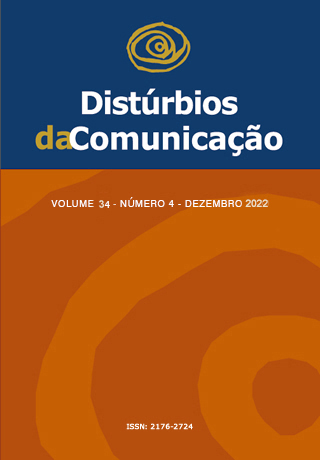Adaptación de la fórmula de nivelación infantil al portugués brasileño
resultados preliminares
DOI:
https://doi.org/10.23925/2176-2724.2022v34i4e58367Palabras clave:
Comprensión, Leer, Redacción, Niño, Narración, Intervención Temprana en la EscuelaResumen
Introducción: Prácticas para la enseñanza de la lectura en Brasil puede ser representada por la adaptación y validación de un instrumento de nivelación de libros infantiles que ya ha demostrado su eficacia en otra lengua y cultura. Objetivo: Este estudio objetiva adaptar la fórmula de Hatcher para nivelar libros infantiles para uso en portugués, poniéndola a disposición como herramienta de trabajo para profesionales de diferentes áreas en lo que se refiere a la selección de libros adecuados a la edad y etapa en la que los lectores están comenzando sus primeros años de alfabetización en Brasil. Método: La investigación seguirá los siguientes pasos para adaptar la fórmula de nivelación para libros infantiles: (1) traducción de la fórmula del idioma de origen al idioma de destino, es decir, del inglés al portugués; (2) síntesis de las versiones traducidas; (3) evaluación de la síntesis por jueces expertos; (4) evaluación de la fórmula por parte del público objetivo, aquí considerados docentes de los primeros años de la enseñanza básica; (5) traducción inversa del instrumento. Resultados: Esta fórmula traducida presentó 72% de coeficiente de validez de contenido, en relación con la claridad, y 80% de pertinencia práctica, demostrando ser un documento útil, de fácil aplicación y adecuado para los profesionales de la salud y de la educación que serán capaz de evaluar y nivelar los libros antes de recomendarlos a lectores principiantes. Se espera, en estudios posteriores, aplicar esta fórmula para facilitar el trabajo en la selección de títulos al público indicado.
Descargas
Citas
Almeida GR et al. Consciência fonológica no processo de aquisição da leitura e da escrita (dissertação de mestrado). Universidade Federal de Uberlândia. Uberlândia, MG; 2018. http://dx.doi.org/10.14393/ufu.di.2018.596
Amorim MCB, Farago AC. As práticas de leitura na educação infantil. Cadernos de Educação: Ensino e Sociedade. Bebedouro, SP, 2(1): 134-54; 2015.
Peruzzo A. A importância da literatura infantil na formação de leitores. Cadernos do CNLF, XV (5): 95-104; 2011. Disponível em: http://www.filologia.org.br/xv_cnlf/tex_completos/a_importancia_da_literatura_infantil_na_ADREANA.pdf.
Basso FP, Salles JF. Instrumento de identificação das práticas de ensino da leitura e da escrita. Ciências & Cognição, 21(2); 255-73; 2016. Disponível em: https://www.cienciasecognicao.org/revista/index.php/cec/article/view/1267
Peroza OT. Ensinar e aprender a ler: projetos de leitura na escola. (dissertação de Mestrado). Universidade Federal da Fronteira Sul. Programa de Pós-Graduação em Estudos Linguísticos. Chapecó, SC; 2019. Disponível em: https://rd.uffs.edu.br/handle/prefix/3245
Freitag RMK, Sá JJS. Leitura em voz alta, variação linguística e o sucesso na aprendizagem inicial da leitura. Ilha Desterro, Florianópolis, 72(3): 41-62;2019. https://doi.org/10.5007/2175-8026.2019v72n3p41
Pereira VW, Viana FL, Morais J. Processamento da leitura: decodificação e compreensão. Letras de Hoje, 54(2): 108-11; 2019. https://doi.org/10.15448/1984-7726.2019.2.34946
Basso FP, Piccolo LR, Miná CS, de Salles JF. Instrumento de Avaliação da Fluência de Leitura Textual: da decodificação à compreensão de leitura. Letras De Hoje, 54(2): 146-153; 2019. https://doi.org/10.15448/1984-7726.2019.2.32519.
Hatcher PJ. Predictors of Reading Recovery book levels. Journal of Research in Reading, 23(1): 67-77; 2000. Department of Psychology, University of York, UK. https://doi.org/10.1111/1467-9817.00103.
Pazeto TCB, León CBR, Seabra AG. Avaliação de habilidades preliminares de leitura e escrita no início da alfabetização. Rev. Psicopedagogia, 34(104): 137-47; 2017. Disponível em: http://pepsic.bvsalud.org/scielo.php?script=sci_arttext&pid=S0103-84862017000200004&lng=pt&nrm=iso.
Mousinho R et al. Compreensão, velocidade, fluência e precisão de leitura no segundo ano do ensino fundamental. Rev. Psicopedagogia, 26(79): 48-54; 2009. Disponível em: http://pepsic.bvsalud.org/scielo.php?script=sci_arttext&pid=S0103-84862009000100007&lng=pt&tlng=pt.
Costa YA. Consciência fonológica: um estudo acerca da formação de professores por meio do pacto nacional pela alfabetização na idade certa (PNAIC). Ministério da Educação. Fundação Universidade Federal de Rondônia. Departamento de Ciências da Educação – DECED. Campus de Ariquemes. Ariquemes, RO; 2019. http://ri.unir.br/jspui/handle/123456789/2927.
Hatcher P. Sound LinkageSound Linkage: Integrated Programme for Overcoming Reading Difficulties. 2ª ed. Chichester: Wiley-Blackwell; 2001.
Hambleton RK. Issues, Designs, and Technical Guidelines for Adapting Tests Into Multiple Languages and Cultures. In: Hambleton RK, Merenda PF, Spielberger CD (orgs.). Adapting Educational and Psychological Tests for Cross-Cultural Assessment. Lawrence Erlbaum Associate, 3-38; 2005.
Sireci SG, Yang Y, Harter J, Ehrlich EJ. Evaluating guidelines for test adaptations: A methodological analysis of translation quality. Journal of Cross-Cultural Psychology, 37(5): 557-56; 2006. https://doi.org/10.1177/0022022106290478
Raymundo VP. Construção e validação de instrumentos: um desafio para a psicolinguística. Let Hoje; 44(3): 86-93; 2009. Disponível em: https://revistaseletronicas.pucrs.br/index.php/fale/article/view/5768
Alexandre NMC, Coluci MZO. Validade de conteúdo nos processos de construção e adaptação de instrumentos de medidas. Ciência Saúde, Rio de Janeiro, 16(7): 3061-68; 2011. https://doi.org/10.1590/S1413-81232011000800006.
Simpson MM. Suggestions for teaching reading infants classes. Wellington: Department of Education; 1962.
Borsa JC, Damasio BF, Bandeira DR. Adaptação e Validação de Instrumentos Psicológicos entre Culturas: Algumas Considerações. Paidéia, v. 22, n. 53, p. 423-432; 2012. https://doi.org/10.1590/S0103-863X2012000300014.
Landim MRM. Compreensão leitora: possibilidades de avaliação ao término do ciclo de alfabetização; 2017. Disponível em: http://hdl.handle.net/11624/1507.
Capovilla AGS, Gutschow CRD, Capovilla FC. Habilidades cognitivas que predizem competência de leitura e escrita. Psicologia: teoria e prática, 6(2):13-26; 2004. Disponível em: http://pepsic.bvsalud.org/scielo.php?script=sci_arttext&pid=S1516-36872004000200002&lng=pt&tlng=pt.
Capovilla FC, Negrão VD, Damázio M. Teste de vocabulário por figuras USP-TVfusp. São Paulo, Memnon; 2011. Disponível em: http://pepsic.bvsalud.org/scielo.php?script=sci_arttext&pid=S1677-04712006000200009&lng=pt
Machado APG, Freitag RMK. Pistas dos processos de decodificação que levam à compreensão da leitura. Letras de hoje, 54(2): 132-45; 2019. https://doi.org/10.15448/1984-7726.2019.2.32509.
Flôres OC. Leitura e consciência linguística. Letras de Hoje, 53(1): 149-57; 2018. https://doi.org/10.15448/1984-7726.2018.1.28535. Disponível em: https://www.scielo.br/j/lh/a/8bXQHRM4kSLrvyNyPdgdPnd/?format=pdf&lang=pt.
Veloso J. A língua na escrita e a escrita da língua. Algumas considerações gerais sobre transparência e opacidade fonêmicas na escrita do português e outras questões. Da Investigação às Práticas. Estudos de Natureza Educacional, 6(1): 49-69; 2005. Disponível em: https://www.researchgate.net/profile/Joao-Veloso-5/publication/259892028_A_lingua_na_escrita_e_a_escrita_da_lingua_Algumas_consideracoes_gerais_sobre_transparencia_e_opacidade_fonemicas_na_escrita_do_portugues_e_outras_questoes/links/00b4952e6d8cd1d859000000/A-lingua-na-escrita-e-a-escrita-da-lingua-Algumas-consideracoes-gerais-sobre-transparencia-e-opacidade-fonemicas-na-escrita-do-portugues-e-outras-questoes.pdf.
Descargas
Publicado
Número
Sección
Licencia
Derechos de autor 2023 Helena Ferro Blasi, Leia Gonçalves Gurgel, Luciane Mari Deschamps

Esta obra está bajo una licencia internacional Creative Commons Atribución 4.0.









